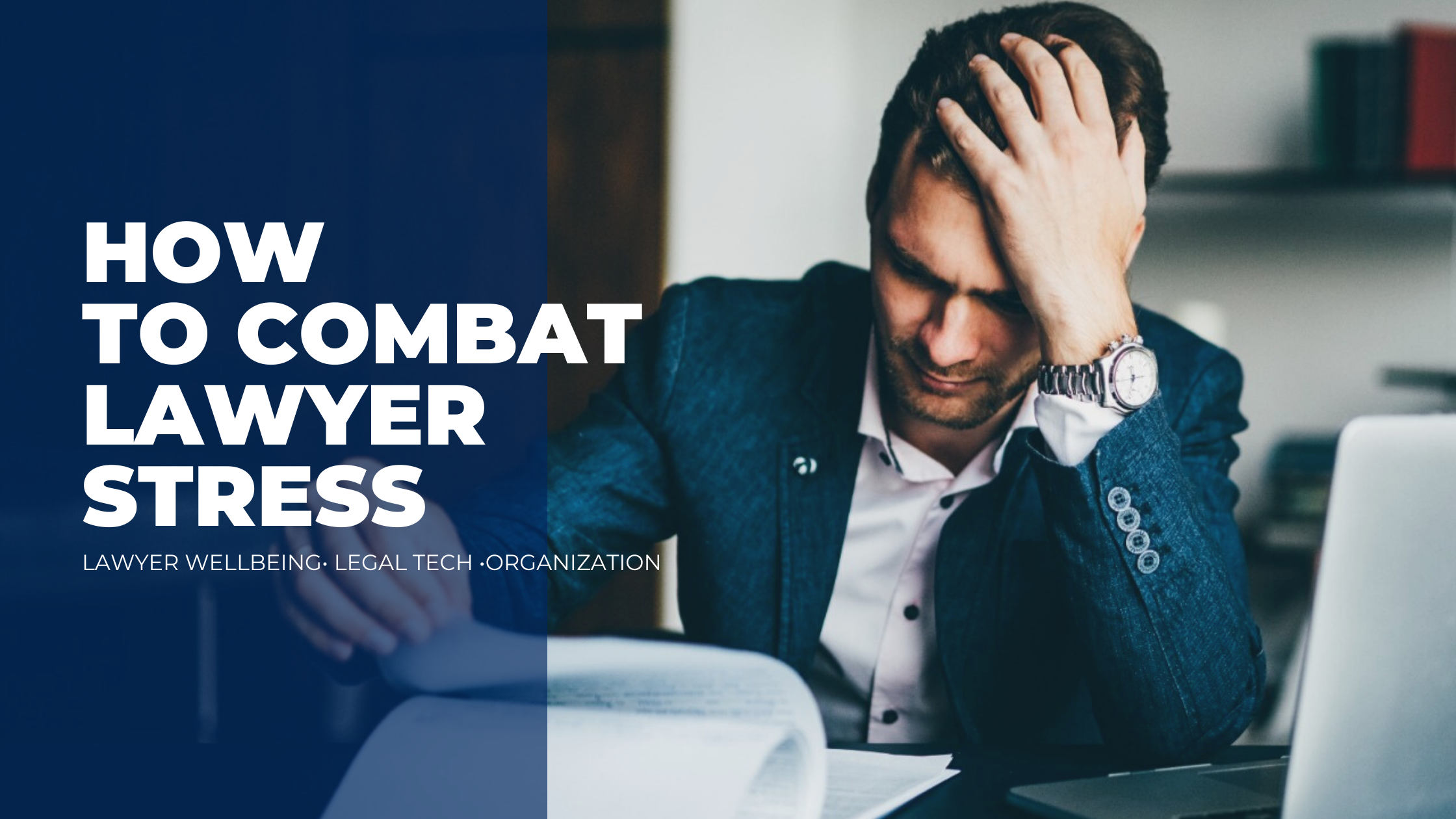Why are lawyers one of the most susceptible professionals to burnout?
How to deal with burnout when you are a lawyer?
Lawyers have many reasons to feel overwhelmed and stressed due to their high stakes work.
People are counting on them to handle complex matters and to do so with precision and efficiency, managing clients, deadlines, hearings, administrative tasks, colleagues, and their personal life. This maze can be mentally consuming if it isn’t handled properly and can take a toll on both mental and physical health.
Furthermore, research shows that lawyers spend a big part of their day on non-billable tasks, like administrative tasks, and following up on colleagues, making their days ever longer. In most cases, working longer hours doesn’t improve productivity – in most cases, it is instead the sign that the organization of work can be improved. According to recent studies, working more than 10 hours per day can increase your chances of cardiovascular issues by as much as 60%. In addition, lawyers often work outside standard business hours to tend to their clients’ needs and often put their own wellbeing on hold. This often takes its toll on lawyers’ health. Scattered and unfocused non-efficient communication, constant interruptions and having to be always reachable by colleagues or clients only adds to the mental load and increases the pressure.
Aside from the legal work, pending to do’s, endless post-its, deadlines and all the tedious administration can create an overbearing mental cloud that piles up during the day. Some lawyers feel like there is no way out of this vicious cycle and don’t get enough time for what really convinced them to pursue law.
Stress ultimately bleeds into all other areas of life and can even cause long-term changes in the body that shouldn’t be overlooked, notably weakening the immune system, and making someone more vulnerable to anxiety and depression.
Aside from a personal negative impact on physical and mental health, a lawyer’s stress also inevitably spills over into the clients’ overall experience and will end up having a long-term negative impact on the firm. Therefore, it’s recommended to take preventative measures to avoid this slippery slope and take advantage of the tools available today to thrive in the legal industry in a sustainable way.
How to take charge of your wellbeing
Here are some ideas on how to prevent stress and avoid burnout:
1. Know your “Big Rocks”:
First and foremost, in order to fight stress, you need to place importance on your own wellbeing and know that it’s worth prioritizing. What are the most important elements in your life? These will be your “big rocks“. The big rock illustration given by the noted author Dr. Stephen Covey, most known for his book “7 Habits of Highly Effective People“, demonstrates that our life is like a jar in which you can place rocks. If you put pebbles in first, you have no space to add any big rocks. By putting the big rocks in first, the smaller rocks fall into place around them. This shows that we must decide what is important to us because our lives have a limited amount of space and resources. We need to decide what matters to us the most, serving as the “big rocks“ and we should make room for them first, so as to not let everything else, all the “little rocks“, obstruct us from what’s important. Your biggest big rock should most reasonably be your own wellbeing. Keeping stress out of your life is the best way you keep your wellbeing intact all while having a productive career.
2. Flipping the script:
Being a lawyer is a high-pressure, stressful occupation and for many having to keep your guard up all the time can result in anxiety. Flipping the script is changing the stereotypical idea of what it means to be a lawyer by incorporating practices that prioritize mental health. This allows for a different script for your life compared to the ever so often representation of the overworked, overloaded, deadline haunted lawyer who is drowning under a multitude of pressures and stress.
We know the mind requires periods of rest to function optimally but sleep alone is sometimes not enough. Dedicated relaxation techniques, also referred to as mindfulness, have become a new coping mechanism for lawyers. Some mindfulness techniques will help you declutter your mind and in turn make you feel less overwhelmed. Mindfulness is one of the best tools to combat stress and the good news is, you can start right now. By taking an only 20-minute break, you can already boost your brain cognition by 70%!
Start by simply taking a series of deep breaths while you’re at your desk. If you want to take it a step further, you can continue with guided meditations with apps such as Waking Up, Headspace and Calm. There are also cognitive behavioral therapy tools designed to reduce stress such as the Sanvello app.
Other solutions to help your mental health would be to try practices on a day-to-day basis such as yoga, walking outdoor, reading, journaling, painting or similar. If you need more support, there are also online therapy platforms such as Betterhelp that connect users with licensed therapists.
3. Take advantage of technology in the workplace
Technology can have a positive impact on stress, especially in the legal industry, and can help to positively transform the way lawyers work and help reduce their mental workload.
To boost efficiency, you need to first know what you are doing that is draining your energy and hurting your overall productivity. Therefore, you must track data to measure your current efficiency and make the necessary changes accordingly. Plot out your responsibilities on apps such as “OneNote” or “Todoist” and get a picture of your professional landscape. You can track where your time is going and determine how many hours a week you spend on actual billable hours with legal reporting software or a calculator tool to see how much money you are leaving on the table every week due to mundane, tech replaceable tasks to maximize your utilization rate.
Automate repetitive aspects of your work to alleviate your load. For the majority of firms, finding ways to streamline and automate non-billable tasks will help make every member more productive. You could outsource draining administrative tasks to case management software. This allows you to keep all your important information on cases, events, deadlines, documents, emails, and tasks in one place and to keep track of your timesheets. Increase revenue of the firm without working more, simply by better tracking your billable hours. This will also allow you to collaborate with colleagues more easily and help with the growing need for more flexibility in the office.
Keep your clients happy by using software that provides a best-in-class client experience, which in turn will give you a piece of mind, knowing your clients are not waiting for an answer or that you should be taking more time to keep them up to date on their case, adding on to your already existing stress. Tools like Rally allow you to have a client portal with a menu of services that you can drop on your website, enabling clients to kick-start work without calling or emailing. Use AI-powered contract review tools such as Legartis to ensure compliance and adherence to corporate policies while focusing on more complex drafting and negotiation challenges. There is a growing list of smart software that can help you in all the areas necessary.
4. Setting boundaries and manage expectations
According to Terry Demeo [1], former trial lawyer and law professor, lawyers feel like they need to be on call and responsive to work 24/7, having no real boundaries between work and personal life, which is a major source of stress. Don’t let the long hours bleed into your personal life and set boundaries with people. Tell them how you want them to treat you and then hold them to it. Be clear in communicating your needs and be consistent with enforcement. Although it is often the hierarchy which is responsible here, suggesting changes is seen as a positive character trait especially in today’s ever so changing landscape where lawyers and firms need to adapt to stay up to date on the market. Some of the most important traits of a modern lawyer are considered fluidity, an ability to question and innovate and tech literacy.
Suggesting new ways to operate by implementing tools and habits within a firm can only boost productivity and competitiveness when done correctly. There are ways to introduce your firm to practices or tools that work for you. Take the first step in making you and your firm better.
Lastly, to see change in your firm or in your own life you need to believe that change is possible. Lawyers are often stereotyped as overly stressed and overworked but there are ways you can take charge of your days and make them easier with small daily habits and the correct tools at hand.
In today’s increasingly efficient world there is no reason to stay behind and suffer from chaos. By using and practicing the tips above, you can significantly reduce your stress.
[1] Legal talk network, from the Podcast from Clio: “Why lawyer wellness matters,” 2019.

